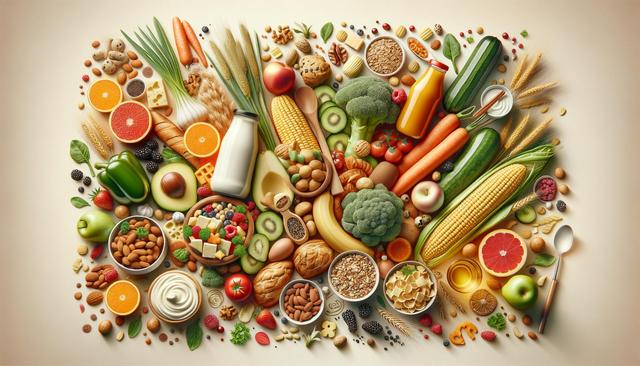Understanding the Nutrients Behind Bone Strength
Maintaining strong bones throughout life is closely tied to a balanced intake of essential nutrients. While calcium often gets the spotlight, other vitamins and minerals play equally important roles in supporting bone density and resilience. A well-rounded approach includes incorporating various calcium rich foods for bone health, as well as ensuring sufficient levels of magnesium, vitamin D, and protein.
Key nutrients for bone health include:
- Calcium: Vital for bone structure and strength.
- Vitamin D: Helps the body absorb calcium more effectively.
- Magnesium: Supports bone formation and helps regulate calcium levels.
- Protein: Contributes to bone repair and growth.
Incorporating these nutrients into your daily meals is essential for a bone health diet plan that works at any age, whether you’re in your 20s building peak bone mass or in your 60s trying to maintain it.
Calcium-Rich Foods to Build Strong Bones
Calcium is the foundational mineral for bones, and consuming a variety of calcium rich foods for bone health can significantly contribute to long-term strength and stability. While dairy products are commonly recognized sources, there are many other natural options suitable for a range of dietary preferences.
Here are some excellent sources of calcium:
- Leafy greens like kale, bok choy, and collard greens
- Fortified plant-based milks such as almond or soy milk
- Sesame seeds and tahini
- Tofu made with calcium sulfate
- Sardines and canned salmon with bones
Adding these options into meals—such as blending greens into smoothies, using tahini in dressings, or topping salads with sardines—makes it easier to meet daily calcium needs and supports overall bone health diet plan goals.
Vitamin D and Magnesium: The Unsung Heroes
While calcium is critical, it cannot be properly utilized without adequate vitamin D. This nutrient helps the body absorb calcium from the digestive tract. Equally important are foods high in magnesium for bones, which assist in bone formation and help balance calcium levels.
Sources of vitamin D foods for strong bones include:
- Egg yolks
- Fatty fish like mackerel and salmon
- Fortified cereals and beverages
- Mushrooms exposed to sunlight
For magnesium, try these natural foods to improve bone density:
- Pumpkin seeds and sunflower seeds
- Legumes such as black beans and lentils
- Whole grains like brown rice and quinoa
- Dark chocolate with high cocoa content
Combining these foods with calcium-rich ingredients can create balanced meals that nourish your bones from multiple angles.
Everyday Meals That Support Bone Health
Integrating the best foods for bone health into your diet doesn’t require drastic changes. Simple adjustments to daily meals can have a significant impact when maintained consistently. Start by planning meals with a variety of vegetables, healthy proteins, and whole grains that align with a bone health diet plan.
Consider these easy, nutrient-packed meal ideas:
- A breakfast bowl with fortified oatmeal, chia seeds, and almond milk
- A lunch salad with spinach, grilled salmon, and a tahini dressing
- A dinner stir-fry with tofu, broccoli, and brown rice
- Snacks like yogurt with pumpkin seeds or a handful of almonds
Small, intentional choices like these help ensure you’re getting foods that strengthen bones throughout the day. Over time, these habits reinforce bone density and overall health.
Bone Health at Every Stage of Life
Bone needs change as we age, but the importance of nutrition remains constant. Children and teenagers require ample nutrients to build strong bones during growth periods, while adults need to maintain bone mass and older individuals must focus on preventing bone loss. Including foods that strengthen bones regularly can benefit people at every stage.
For different life stages, consider these focuses:
- Children and Teens: Emphasize calcium and vitamin D for growth.
- Adults (30-50): Balance calcium, magnesium, and protein intake.
- Older Adults: Focus on preserving bone density with nutrient-rich, easy-to-digest meals.
By adjusting your bone health diet plan to your age and lifestyle, you can better support your bones’ needs and promote overall well-being for years to come.
Conclusion: Nourishing Your Bones for the Long Term
Supporting bone health is a lifelong commitment that starts with what’s on your plate. By prioritizing natural foods to improve bone density and including a range of foods high in magnesium for bones, vitamin D foods for strong bones, and calcium rich foods for bone health, you can give your body the tools it needs to build and maintain strong bones. Whether you’re just starting to think about bone health or you’re looking to make improvements, simple dietary changes can make a meaningful difference. Eating well today helps lay the foundation for a stronger, healthier tomorrow.




Leave a Reply